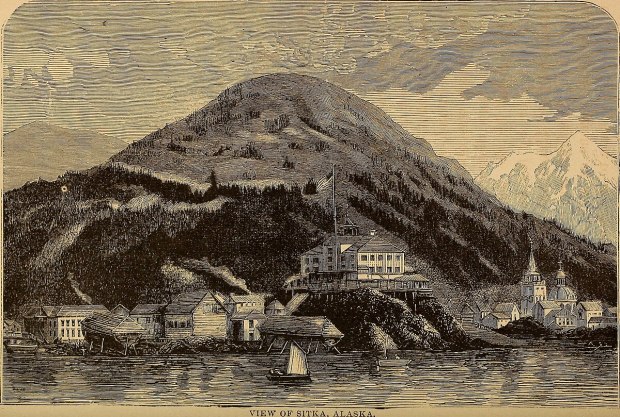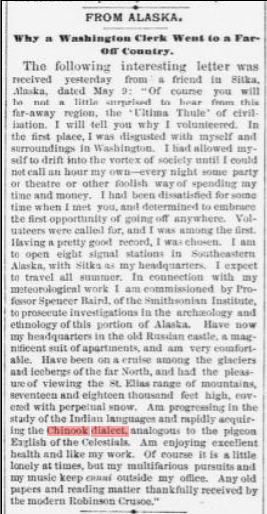1881: From Alaska — Why a Washington [DC] Clerk Went to a Far-Off Country
When Alaska was still a newly acquired territory of the USA (since 1867), most Americans to be found there were located in its southeast panhandle.

Sitka shortly before today’s letter was written (image credit: Wikipedia)
Here’s a letter from one such early “Outsider”, headquartered in Sitka and having to learn Chinook Jargon to accomplish his work in the still Native-dominated territory.

FROM ALASKA.
Why a Washington Clerk Went to a Far-
Off Country.The following interesting letter was
received yesterday from a friend in Sitka,
Alaska, dated May 9: “Of course you will
be not a little surprised to hear from this
far-away region, the ‘Ultima Thule’ of civil-
ization. I will tell you why I volunteered. In
the first place, I was disgusted with myself and
surroundings in Washington. I had allowed my-
self to drift into the vortex of society until I could
not call an hour my own — every night some party
or theatre or other foolish way of spending my
time and money. I had been dissatisfied for some
time when I met you, and determined to embrace
the first opportunity of going off anywhere. Vol-
unteers were called for, and I was among the first.
Having a pretty good record, I was chosen. I am
to open eight signal stations In Southeastern
Alaska, with Sitka as my headquarters. I expect
to travel all summer. In connection with my
meteorological work I am commissioned by Pro-
fessor Spencer Baird, of the Smithsonian Institute,
to prosecute investigations in the archeology and
ethnology of this portion of Alaska. Have now
my headquarters in the old Russian castle, a mag-
nificent suit of apartments, and am very comfort-
able. Have been on a cruise among the glaciers
and icebergs of the far North, and had the pleas-
ure of viewing the St. Elias range of mountains,
seventeen and eighteen thousand feet high, cov-
ered with perpetual snow. Am progressing in the
study of the Indian languages and rapidly acquir-
ing the Chinook dialect, analogous to the pigeon
English of the Celestials. Am enjoying excellent
health and like my work. Of course it is a little
lonely at times, but my multifarious pursuits and
my music keep ennui outside my office. Any old
papers and reading matter thankfully received by
the modern Robinson Crusoe.”
— from the Washington (DC) National Republican of June 08, 1881, page 4, column 5
